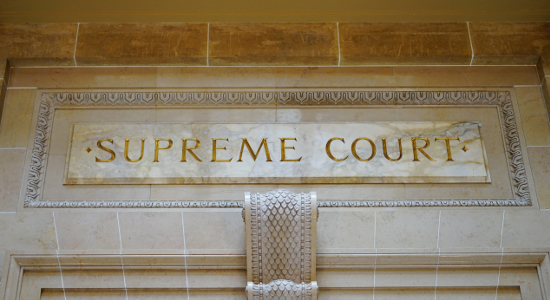
May 31, 2018 – When a circuit court dismisses a foreclosure action for borrower default, claim preclusion does not bar the lender from bringing a second foreclosure action for continuing default, the Wisconsin Supreme recently ruled in a unanimous (7-0) decision.
A circuit court dismissed, with prejudice, a foreclosure action that Federal National Mortgage Assoc. (Federal National) brought against Cory Thompson (and his spouse) because Federal National did not validly accelerate payment of the amount due.
But in Federal National Mortgage Assoc. v. Thompson, 2018 WI 57 (May 24, 2018), the state Supreme Court unanimously ruled that Federal National was not barred from refiling a foreclosure action against Thompson, who continued to remain in default.
“[Claim preclusion does not bar the lender from bring a subsequent foreclosure action based upon the borrower’s continuing default on the same note,” wrote Justice Shirley Abrahamson, a 40-year justice who announced that she will not seek reelection in 2019.
“The matters that were litigated or might have been litigated in the earlier lawsuit are not the same as those in the instant case,” she explained. “A different set of operative facts predicated upon separate and distinct defaults on the note is alleged in each lawsuit.”
In 2004, Thompson executed a note secured by a mortgage on real property for about $163,000. An acceleration clause allowed the lender to accelerate the full amount of unpaid principal plus interest if a number of conditions were met.
A default had to occur, the lender had to send written notice of intent to accelerate if Thompson did not cure the default by a given date, and the opportunity to cure period could not be less than 30 days from the date the note was mailed or delivered.
BAC Home Loans Servicing, the note holder, filed a lawsuit against Thompson after he defaulted. In 2012, the circuit court determined that BAC Home Loans failed to present evidence that it sent a Thompson a notice of intent to accelerate full payment.
The court also ruled that BAC Home Loans failed to show it had possession of the original note entitling them to enforce the note. The court dismissed the case.
In 2014, Bank of America (the loan servicer) sent Thompson the requisite notice of intent to accelerate payment of the note, which continued in default since 2009 (well before the first lawsuit ended). Bank of America then filed a foreclosure action.
The circuit court ruled that BOA could not re-litigate the same allegations for the time period between 2009 and 2012, since that was the time period covered by the first lawsuit. But it could go after Thompson for continuing default occurring after dismissal.
The court also admitted a copy of the original note as self-authenticating after Federal National (now the note holder) presented a purported original wet-ink note and the judge compared the two. The copy was admitted over Thompson’s objection.
Supreme Court Affirms
The Supreme Court took the case on certification from the Court of Appeals, which asked whether claim preclusion bars continuing default if the case was dismissed.
In this case, the answer was no because the lawsuits did not share a “common nucleus of operative facts.” That is, “each lawsuit relates to a set of operative facts that occurred at a different time” and the previous lawsuit did not involve a valid acceleration.
“Thompson was obligated to continue making installment payments after the dismissal of the 2010 lawsuit, and claim preclusion does not prevent Federal national from suing Thompson for failing to make those payments,” Justice Abrahamson wrote.
Finally, the Supreme Court addressed the evidentiary issue that Thompson raised in circuit court when he objected to the judge admitting a copy of the purported original note, concluding the circuit court did not err in admitting the copy.
On this issue, the court followed its recent decision in Deutsche Bank National Trust Co. v. Wuensch, 2018 WI 35 (April 17, 2018), which involved substantially the same issue.
